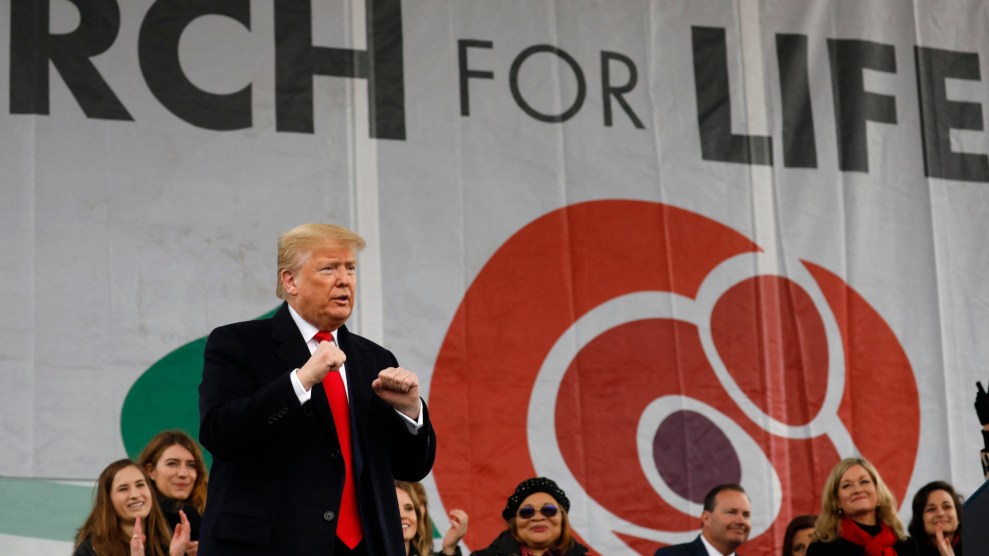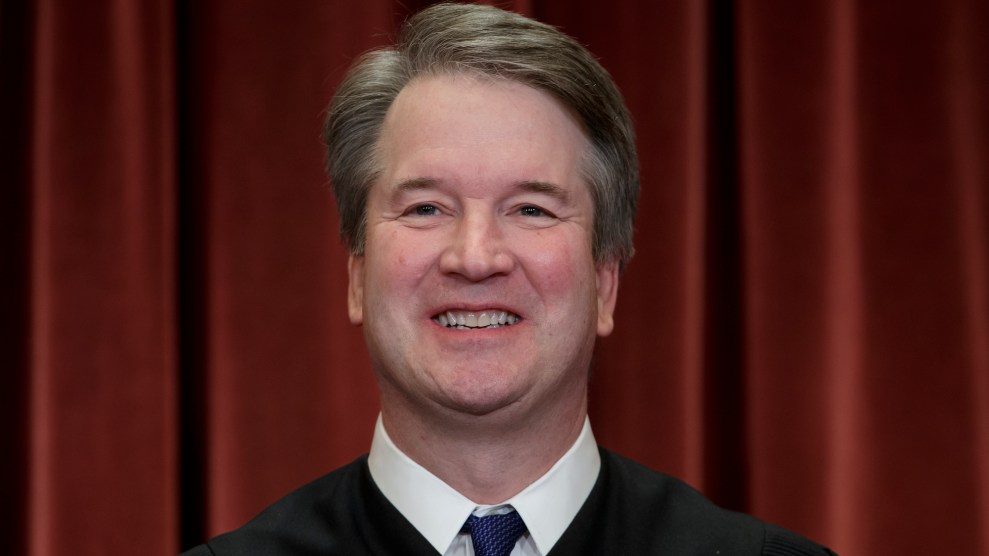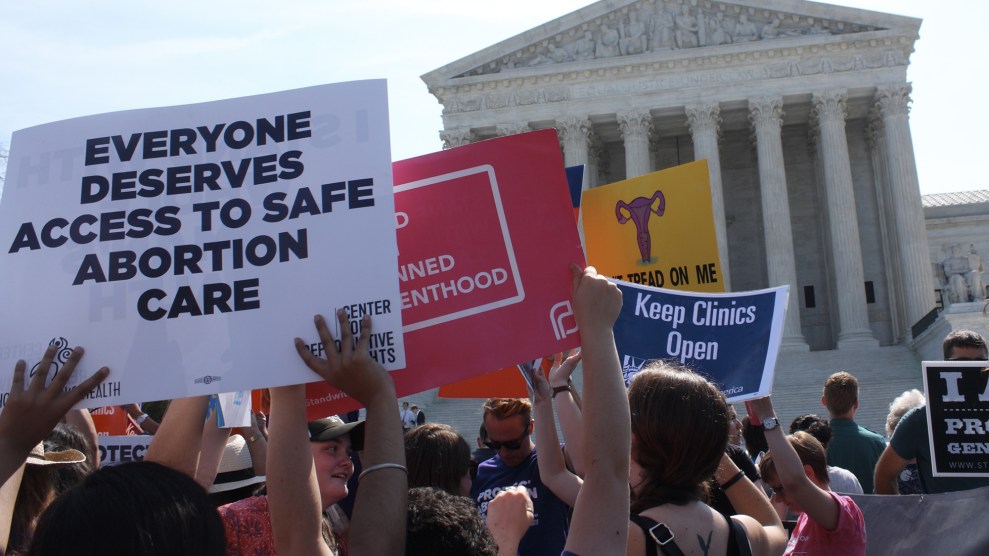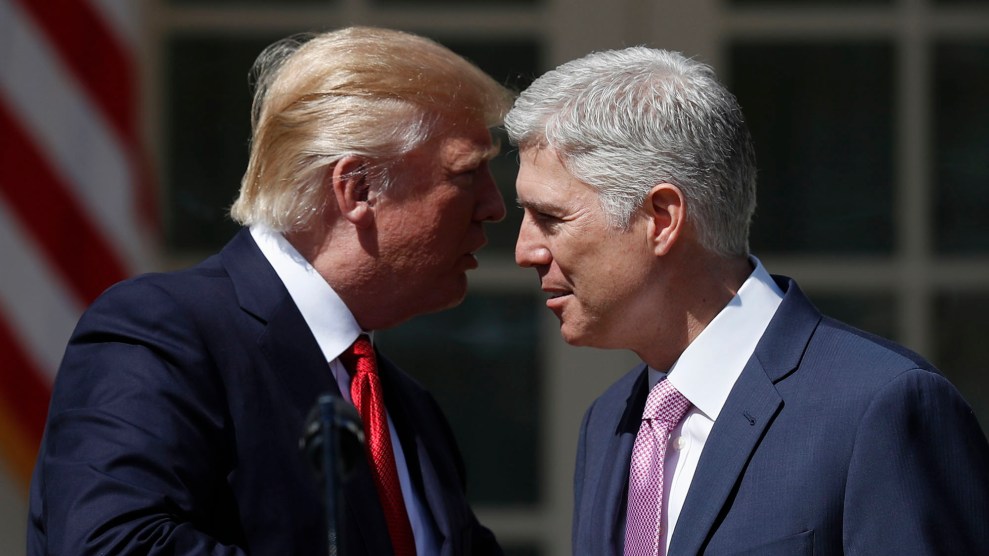
President Donald Trump at the 47th annual March for Life.Abaca Press/SIPA USA/AP
As the time before Election Day continues to dwindle, President Donald Trump is trying to shore up or win back supporters wherever he can. For the white suburban women who helped push him to victory in 2016, for instance, he’s peddling LAW AND ORDER! And for the supporters on the Christian right, he just released a Supreme Court nominee shortlist that is chock-full of far-right legal minds.
Crucially, the list almost explicitly declares that in a second Trump term, Roe v. Wade is dead. Maybe Trump is hoping these lady suburbanites don’t look at the list and the history of the 20 people on it too closely; just 13 percent of small city/suburban women support overturning Roe.
Lucky for us, we have shortlister Sen. Tom Cotton (R-Ark.) broadcasting the message, with zero ambiguity, just a half-hour after Trump’s announcement:
It's time for Roe v. Wade to go.
— Tom Cotton (@TomCottonAR) September 9, 2020
To be clear: A Republican favoring anti-abortion judges is nothing new. It’s just not usually so…obvious, let alone explicit. Don’t forget Susan Collins still really believes Brett Kavanaugh considers Roe settled law.
As for the potential future justices beyond Cotton, there are two other senators on the list, Ted Cruz (R-TX) and Josh Hawley (R-MO). Both have been equally outspoken about their abortion opposition. On the campaign trail in 2016, Cruz argued that Roe wasn’t settled law, and that abortion should be banned even in cases of rape and incest. Just last week, Cruz and Cotton signed onto a letter asking the FDA to take Mifeprex, commonly known as the abortion pill, off the market. Hawley meanwhile has declared that he would only support a Supreme Court nominee who explicitly acknowledges that Roe was “wrongly decided.” In a July interview with the Washington Post, he explained: “Roe is central to judicial philosophy. Roe is and was an unbridled act of judicial imperialism. It marks the point the modern Supreme Court said, ‘You know, we don’t have to follow the Constitution. We won’t even pretend to try.’”
The rest of Trump’s list is far less vocal about the issue, but that doesn’t mean they’re less extreme—multiple of Trump’s candidates have support from groups with anti-abortion views, like the Federalist Society and the Susan B. Anthony List. Here’s a limited sampling:
- Sarah Pitlyk, a Trump-nominated federal judge in Missouri, has a long track record of opposing abortion, as well as surrogacy and fertility treatment. She’s also claimed that frozen embryos should be considered human beings and that destroying them is akin to killing children.
- Gregory Katsas, now a federal appeals court judge in the District of Columbia, fought to limit abortion access as a high-ranking official in the Bush administration and has also stated “the right of abortion, which isn’t in the Constitution […] has all these made-up protections.”
- Stuart Kyle Duncan, a judge on the 5th Circuit Court of Appeals, repeatedly upheld the admitting privileges law that was eventually overturned in Whole Women’s Health v. Hellerstedt, and once again challenged and overturned more recently in Louisiana’s June Medical Services v. Russo. And as the lead counsel in a major contraception case, Burwell v. Hobby Lobby, he argued that some forms of contraception amount to abortion.
- James Ho, one of Duncan’s colleagues on the 5th Circuit, has used his written opinions to lament “the moral tragedy of abortion” and defend fetal burial requirements.
- Daniel Cameron, the attorney general of Kentucky (who is deciding the future of the Breonna Taylor case), fought valiantly against the state’s governor to temporarily ban abortions during the coronavirus pandemic because they should not be considered “essential procedures.” The state legislature stepped in and passed a law granting Cameron the power to shut down the state’s abortion clinics himself.
Theresa Lau, senior counsel at the National Women’s Law Center, said that her organization has vehemently opposed previous nominations for folks on Trump’s shortlist, include Pitlyk, Duncan, and Katsas. When I asked her thoughts on the nominees, she was unequivocal: “Everyone on that list is extremely troubling.”


















